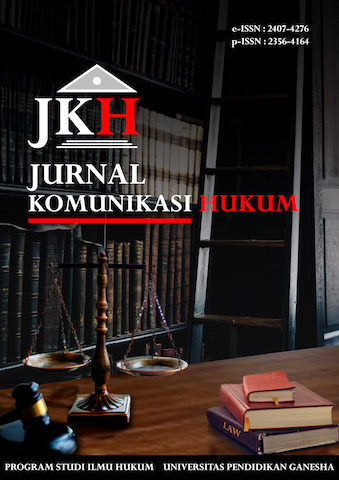POLLUTER PAYS PRINCIPLE DALAM KETENTUAN PERUNDANGAN PENGELOLAAN AIR LIMBAH DOMESTIK DI KECAMATAN CIRACAS JAKARTA TIMUR
DOI:
https://doi.org/10.23887/jkh.v8i2.51183Abstract
People's daily activities for cooking, bathing, washing, latrines, produce household domestic wastewater which has the potential to cause water pollution, both well water and river water. This is exacerbated by the lack of public awareness of the environment and low public understanding of the Polluter Pays Principle. This research was conducted to identify the understanding of the people of Ciracas District, the provisions and implementation, the alignment of the provisions of the legislation related to the management of domestic wastewater, as well as the obstacles faced in its implementation. It is concluded that the public's understanding of the Polluter Pays Principle is still low. The construction of a domestic wastewater management installation in the Kampung Rambutan Reservoir can be a real step in an effort to increase public awareness in managing domestic wastewater. The alignment of the provisions of laws and regulations regarding the application of the Polluter Pays Principle in domestic household wastewater management still needs to be improved. The obstacle in its implementation is the lack of formal and informal education for the community about domestic wastewater management. The role of the government which is felt to be less than optimal is also an obstacle in growing public awareness in managing domestic wastewater. In addition, plans for the development of a domestic wastewater management system are generally also constrained by the low participation and resistance of the community.
Downloads
Published
How to Cite
Issue
Section
License
Authors who publish with this journal agree to the following terms:- Authors retain copyright and grant the journal right of first publication with the work simultaneously licensed under a Creative Commons Attribution License that allows others to share the work with an acknowledgement of the work's authorship and initial publication in this journal.
- Authors are able to enter into separate, additional contractual arrangements for the non-exclusive distribution of the journal's published version of the work (e.g., post it to an institutional repository or publish it in a book), with an acknowledgement of its initial publication in this journal.
- Authors are permitted and encouraged to post their work online (e.g., in institutional repositories or on their website) prior to and during the submission process, as it can lead to productive exchanges, as well as earlier and greater citation of published work (See The Effect of Open Access).
Authors who publish with this journal agree to the following terms:
- Authors retain copyright and grant the journal right of first publication, with the work [SPECIFY PERIOD OF TIME] after publication simultaneously licensed under aCreative Commons Attribution License that allows others to share the work with an acknowledgement of the work's authorship and initial publication in this journal.
- Authors are able to enter into separate, additional contractual arrangements for the non-exclusive distribution of the journal's published version of the work (e.g., post it to an institutional repository or publish it in a book), with an acknowledgement of its initial publication in this journal.
- Authors are permitted and encouraged to post their work online (e.g., in institutional repositories or on their website) prior to and during the submission process, as it can lead to productive exchanges, as well as earlier and greater citation of published work (See The Effect of Open Access).












